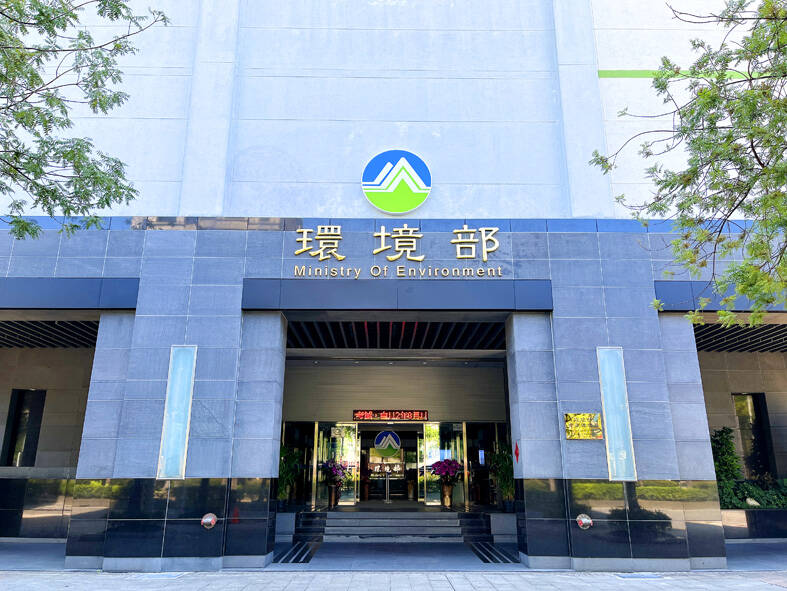The Ministry of Environment has released updated National Climate Change Action Guidelines, incorporating the goal of net zero emissions by 2050 and more details on key strategies first announced in March last year.
Following a revision of the Greenhouse Gas Reduction and Management Act (溫室氣體減量及管理法) into the Climate Change Response Act (氣候變遷因應法) earlier this year and the announcement of the net zero goal early last year, the ministry updated the guidelines and made the changes public on Thursday.
The revised guidelines retain the aim of the original, namely the need to construct a green and low carbon homeland that is able to adapt to climate risks and ensure the nation’s sustainable development.

Photo: Chen Chia-yi, Taipei Times
Also retained were the objectives to enhance the country’s adaptability and resilience against climate change, as well as reducing greenhouse gas emissions.
One key difference is that in 2017 the objective was the gradual reduction of greenhouse gas emissions to 50 percent of 2005 emissions level by 2050, while the latest version seeks to achieve net zero emissions by that year.
The guidelines also lay down general principles to be observed by the government.
The unchanged principles include complying with the Kigali Amendment to the Montreal Protocol, which calls for the gradual phasing-out of hydrofluorocarbons, and the Paris Agreement.
Others are transparency in policymaking, enhancing science-based climate change-adaptive capabilities, improving the efficiency of energy use, and emphasizing the partnership between the central and local governments, and their cooperation with non-governmental organizations and international actors.
The revised principles in the updated guidelines are those that follow the net zero 2050 transition plan from early last year.
The policy is based on energy, industrial, lifestyle and social transition, while two foundations are to be established to focus on upgrading technological research and development, and bolstering climate-related legislation.
The general principles in the revised guidelines also introduce the concept of justice in transition, highlighting the importance of generational and environmental justice.
The prioritization of the collection of carbon fees through a cap-and-trade scheme is another change, with implementation of a scheme having been “evaluated.”
The “nuclear-free homeland” goal remains in place, underlining that no expansion of nuclear power would be adopted as a means to combat climate change, but in the same sentence it also stresses the reliance on fossil fuel would be gradually lowered and renewable energy development goals introduced.
Policies for actual climate change mitigation have been outlined in greater detail and include identifying solar power and offshore wind power as mature renewable energy to be further developed and calling for the development of “forward-looking” geothermal, biomass and marine energy.
The construction of a supply and demand system for hydrogen was also highlighted in the updated mitigation policies.

Taiwan has received more than US$70 million in royalties as of the end of last year from developing the F-16V jet as countries worldwide purchase or upgrade to this popular model, government and military officials said on Saturday. Taiwan funded the development of the F-16V jet and ended up the sole investor as other countries withdrew from the program. Now the F-16V is increasingly popular and countries must pay Taiwan a percentage in royalties when they purchase new F-16V aircraft or upgrade older F-16 models. The next five years are expected to be the peak for these royalties, with Taiwan potentially earning

STAY IN YOUR LANE: As the US and Israel attack Iran, the ministry has warned China not to overstep by including Taiwanese citizens in its evacuation orders The Ministry of Foreign Affairs (MOFA) yesterday rebuked a statement by China’s embassy in Israel that it would evacuate Taiwanese holders of Chinese travel documents from Israel amid the latter’s escalating conflict with Iran. Tensions have risen across the Middle East in the wake of US and Israeli airstrikes on Iran beginning Saturday. China subsequently issued an evacuation notice for its citizens. In a news release, the Chinese embassy in Israel said holders of “Taiwan compatriot permits (台胞證)” issued to Taiwanese nationals by Chinese authorities for travel to China — could register for evacuation to Egypt. In Taipei, the ministry yesterday said Taiwan

Taiwan is awaiting official notification from the US regarding the status of the Agreement on Reciprocal Trade (ART) after the US Supreme Court ruled US President Donald Trump's global tariffs unconstitutional. Speaking to reporters before a legislative hearing today, Premier Cho Jung-tai (卓榮泰) said that Taiwan's negotiation team remains focused on ensuring that the bilateral trade deal remains intact despite the legal challenge to Trump's tariff policy. "The US has pledged to notify its trade partners once the subsequent administrative and legal processes are finalized, and that certainly includes Taiwan," Cho said when asked about opposition parties’ doubts that the ART was

If China chose to invade Taiwan tomorrow, it would only have to sever three undersea fiber-optic cable clusters to cause a data blackout, Jason Hsu (許毓仁), a senior fellow at the Hudson Institute and former Chinese Nationalist Party (KMT) legislator, told a US security panel yesterday. In a Taiwan contingency, cable disruption would be one of the earliest preinvasion actions and the signal that escalation had begun, he said, adding that Taiwan’s current cable repair capabilities are insufficient. The US-China Economic and Security Review Commission (USCC) yesterday held a hearing on US-China Competition Under the Sea, with Hsu speaking on